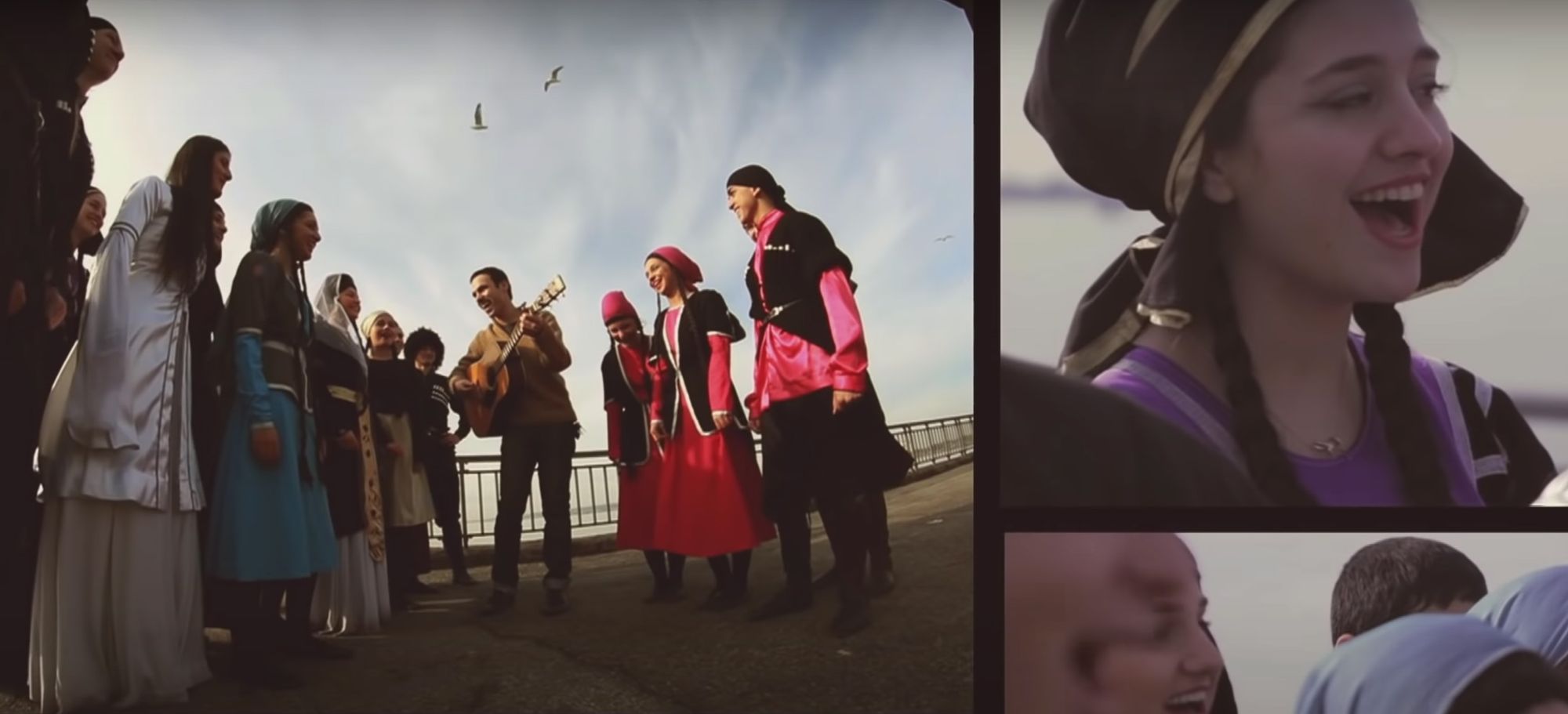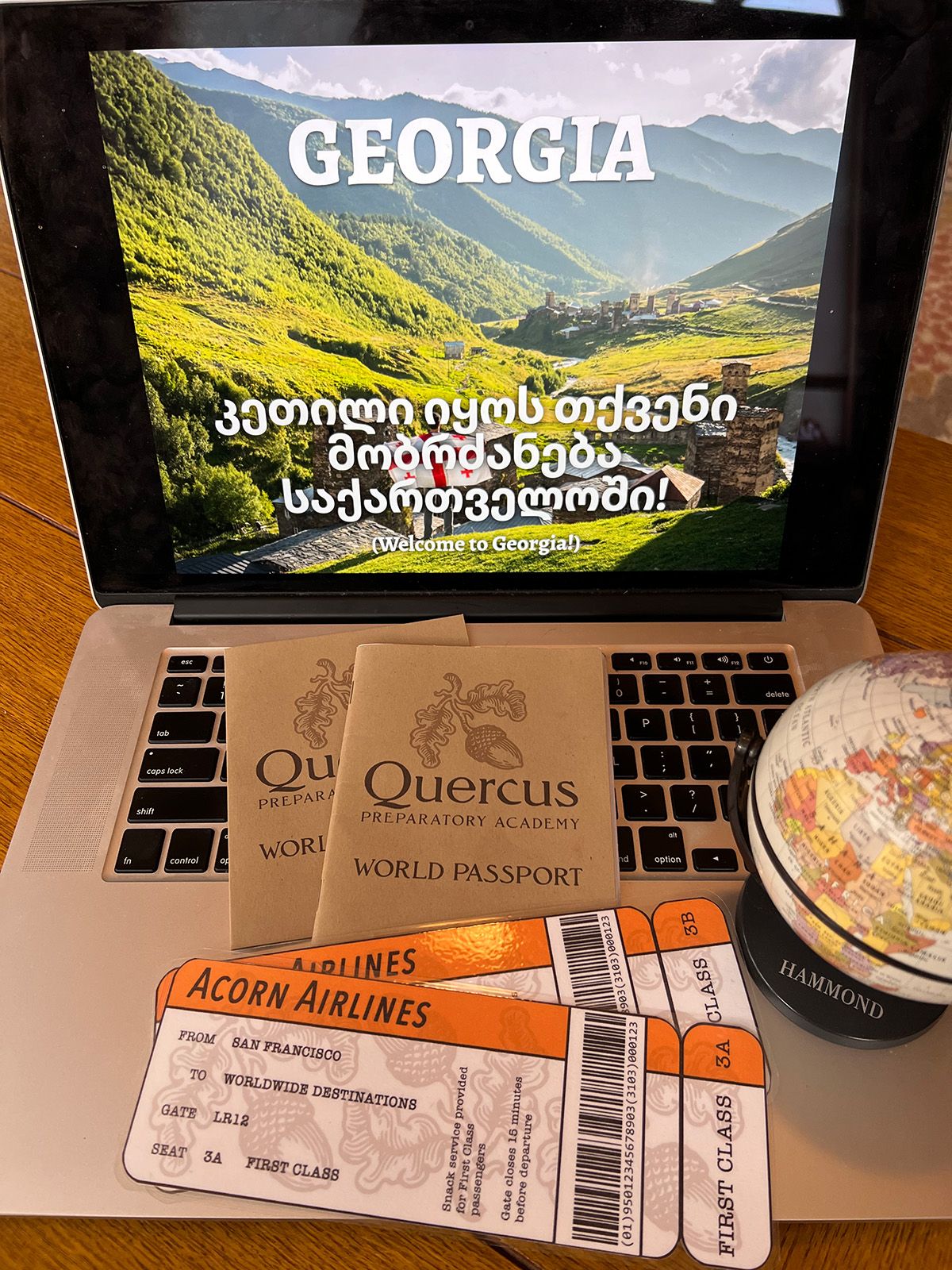Georgian folk music
The first two songs we learned in the Carnegie Hall Musical Explorers program are Georgian folk music, with musician Ilusha Tsinadze.

The first two songs we learned in the Carnegie Hall Musical Explorers program are Georgian folk music, with musician Ilusha Tsinadze.
As I was watching the teach-the-teacher videos to go with the lessons, I realized that this was our chance to learn about the country of Georgia. I can't think of a time when Georgia has come up in any of our lessons—heck, I can't think of a time when it has come up in my own learning. But it's a fascinating country: it's at the meeting point of Europe, Asia, and the Middle East, and all three are evident in its history and culture—but nestled between the two Caucasus mountain ranges, it has also been somewhat isolated, and has developed as a unique culture.

For instance, check out the Georgian language. It's gorgeous! And it's unrelated to any languages found outside the Caucasus—it's not even related to Proto-Indo-European.

This called for a trip on Acorn Airlines! That's our pretend airline, which we fly when doing a deep dive on a geographic location. I whipped up a quick Google Slides presentation about Georgia for our in-flight entertainment, and we were off. Our Georgia learning was spread over a few days, a little bit each afternoon.
We started with our typical geography go-to for learning about countries, the YouTube channel Geography Now! Geography Now! has videos profiling nearly all of the world's countries. The Georgia episode is about 12 minutes long, briefly covering its physical geography, culture, demographics, history, and more. Early in the video, host Barby answers one of my first questions: is there an etymological link between the names of Georgia, the country, and Georgia, the U.S. state? Big nope! Georgia (the country) likely comes from a Persian word meaning "wolf," and Georgia (the state) was named for Britain's King George II. Also, while the official name of the country is Georgia, the native name is Sakartvelo, and Georgians are called Kartvelians.
From there, we watched a wonderful short documentary for Brooklyn Independent Television about the musician we'd be learning from, Brooklyn-based Ilusha Tsinadze. If you only watch one thing from this post, make it this video. I greatly enjoyed learning about Ilusha.
Then, after a quick warm-up vocal exercise, we dove into our first Carnegie Hall Musical Explorer lessons. We started with this video with Ilusha introducing himself and explaining a bit about his personal relationship with Georgian folk music. This video is the one meant for teachers, rather than the similar Ilusha intro video created for kids, but I thought Wanda would like this one better.
Then it was time for our first song! It was "Shina Vorgil," a very fun call-and-response folk song from the Svaneti region of northwest Georgia. In addition to experiencing how call-and-response works, we learned the musical term "accelerando," which means the tempo of the song gradually speeds up. The Carnegie Hall Musical Explorer website has full lesson plans for each song, including videos, audio files, sheet music, lyrics, and most importantly a teach-the-teacher video in their Professional Development section.
Our next song was an original composition by Ilusha Tsinadze, "Shen Genacvale," a folk song expressing the love and devotion he feels for his friends and family in Georgia. In the lesson, students hear two different versions of the song, with the same melody and lyrics, but with the tempo slowed down for a more melancholy version, helping students see how emotional tone can be influenced by tempo.
There are many more resources and activities on the Musical Explorers website to go with these two songs; be sure to check them out, especially if you have younger learners.
Polyphonic singing is a celebrated and deeply historic element of Georgian folk music, and after our Musical Explorer lessons were complete, we spent some time watching videos from Trio Mandili, a very popular polyphonic trio based out of Tbilisi, Georgia.
We watched about half of a documentary about Georgia on YouTube that was in the extra resources recommended by the Musical Explorers program, but honestly it felt like the hand of Georgia's tourism bureau was overly present and we didn't finish it. We did appreciate learning more about the Georgian traditional feast, the supra, which has lots of music, toasts, and shared food.
A new addition to our Acorn Airlines trips: I used the Seterra geography quiz app to create a custom map quiz with Georgia, its disputed regions of Abkhazia and South Ossetia, and all of its neighboring countries. (Learning about Georgia also finally helped me remember which is which between Abkhazia and South Ossetia for my personal Seterra quiz work; I kept getting them mixed up.)
For our final activity, Wanda wrote a paragraph about Georgia. Writing about a topic is an excellent way to increase comprehension and retention. I've been using writing strategies from The Writing Revolution across most of our learning for a couple of years now. My belief in the value of that book has only grown. Possibly the best $35 I've spent in homeschooling.
Carnegie Hall brings together groups of three musicians from Musical Explorers to play together for one program on stage, so that NYC elementary students get to experience a live concert with the songs they've been learning in school. Videos of the full concerts are provided on the Musical Explorers website, but Wanda won't see it until we've finished learning the Haitian songs. I watched it during lesson planning, and I gotta tell you: the way the little kids in the theater LOST THEIR DANG-FLIPPITY MINDS when they heard Ilusha start singing "Shina Vorgil!" He was a major rock star on that stage that day. We're talking Beatlemania-scale screaming. I honestly started to tear up a little bit. I hope that moment felt incredible for Ilusha.

